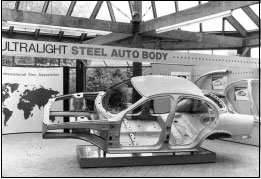 |
CORPORATE AVERAGE FUEL
ECONOMY (CAFE) STANDARDS
American Iron and Steel Institute policy
statement on behalf of its U.S. producer
members.
AISI supports market-based efforts to promote
energy-efficient vehicles in keeping with the
steel industry's commitment to energy
conservation. AISI strongly supports efforts by
the Congress to maintain Corporate Average Fuel
Economy (CAFE) standards at current levels and
opposes efforts to increase CAFE standards.
Increasing CAFE would be counterproductive in
terms of energy saving and would interfere with
market forces. AISI agrees with legislative
proposals to return the responsibility for CAFE
standards for light trucks to Congress from the
Department of Transportation (DOT).
- Goals not achieved. Since CAFE was
passed in 1975, the fuel economy of cars have
been governed by Congressional enactments. Light
truck standards have been set by DOT
regulations. In that period, the CAFE program
has failed to achieve its original intent. The
two original goals have not been met:
- Goal: Increase energy conservation.
Rising fuel prices in the 1970's and early
1980's created demand for fuel efficient
technologies. Vehicle dimensions shrunk, mass
declined, engines downsized, aerodynamics
improved, and front wheel drive was introduced.
CAFE standards had little to do with these
changes. In fact, most fleets exceeded the
standards during this time.
- Goal: Reduce reliance on imported
oil. Oil imports have actually increased
since CAFE was implemented. Currently about 50%
of U.S. oil is imported versus 35% in 1974. CAFE
was enacted during the energy crisis. Later, the
federal government deregulated oil, coupled with
increased OPEC production in the mid 1980s, oil
supplies increased and gasoline prices fell to
levels that today are among the lowest in
history. Consumers have reacted to low gasoline
prices by purchasing larger more powerful
vehicles and driving more miles.
- Unintended effects of CAFE. CAFE has
had unintended and damaging effects.
- Higher standards hurt the
environment. By adding to the cost of new
cars, CAFE discourages owners of older, dirtier
cars from buying newer, cleaner cars. This
extends the operating life of older cars, which
results in more - not less - air pollution.
- Safety sacrificed. CAFE has caused
2,000 deaths and 20,000 injuries per year,
according to DOT. Occupant death rates are
higher in smaller, lighter vehicles because they
have less structure, mass and size to absorb
crash energy.
- Prices approaching unaffordability.
The National Academy of Science says CAFE
increases could add $2,750 per vehicle over the
next decade. Higher prices could reduce sales of
new cars and light trucks by 575,000 units per
year between 2005 and 2010.
- Benefit to off-shore producers over
domestic producers. Many off-shore producers
would benefit from higher CAFE standards because
of their product mix which favors smaller
vehicles.
WHY CAFE IS IMPORTANT TO STEEL
- Steel's commitment to energy efficiency
- and to staying competitive. Steel is doing
more than just arguing against CAFE to stay
competitive. Steelmakers worldwide are taking
great pains to keep steel the material of choice
in the increasingly energy-efficient vehicle of
the future. Nearly fifty percent of all steels
used today in automotive applications were not
available five years ago. Because they are
lighter, stronger, and more resistant to
corrosion than ever before, it makes sense that
these newly engineered steels are being employed
in the manufacture of automobiles. An
international group of steel companies, known as
the Ultralight Steel Auto Body (ULSAB)
Consortium, is engaged in a multi-million dollar
project to develop lighter weight steel auto
bodies without sacrificing safety. Significant -
even dramatic - lightweighting has been
accomplished in the body-in-white without
sacrificing strength, manufacturability, and
affordability. Follow-on successes in auto
closures (doors, hoods, trunk decks) and
suspension systems are also in hand. Additional
consortium goals have been identified and the
funding committed, all from steel industry
sources.
- Cars and trucks are steel's biggest
market. In recent years, the steel industry
has learned valuable lessons about how to stay
competitive in the global marketplace, but it
comes back to what any major supplier knows:
what concerns our customers must concern us. It
is clear that any further increases in CAFE
standards would have a serious negative impact
on the American steel industry's largest single
consumer market - the American automobile
industry.
- Higher CAFE means less steel in autos and
light trucks. Increases in CAFE standards
force automakers to do several things to comply.
One is to expand existing fuel efficiency
technologies to a greater percentage of the
fleet. This approach has limited potential.
Another is to look for new technologies, not
already in the manufacturing pipeline, to
achieve greater fuel efficiency. As opposed to
the first round of CAFE standards, such
"breakthrough" technology is not there just
waiting on the shelf. Automakers will be forced
into the alternative of reducing the weight of
the vehicle. Because many car buyers do not want
smaller cars, downweighting will almost
certainly come in the form of substituting
lighter materials for steel - if such materials
are available and affordable. If not available
or affordable, the American automaker could
discontinue making certain types of vehicles
(e.g., light trucks and sports utility vehicles)
and foreign competitors will be there to step
in. (Foreign vehicle makers will be happy to
"compete" in this stacked business setting
because their product mix favors small vehicles,
and because they have unused CAFE credits banked
from earlier model years.)
- Steel: the price is right. Steel
costs less that alternative materials - much
less. Affordability is a major consumer concern
that can be met by keeping steel the automotive
material of choice. CAFE increases will replace
steel with much

Through the ULSAB
project, the steel industry has proven that
you can reduce car weight without sacrificing
safety, performance, affordability, or
recyclability. much more expensive materials.
 To
Top To
Top
|





